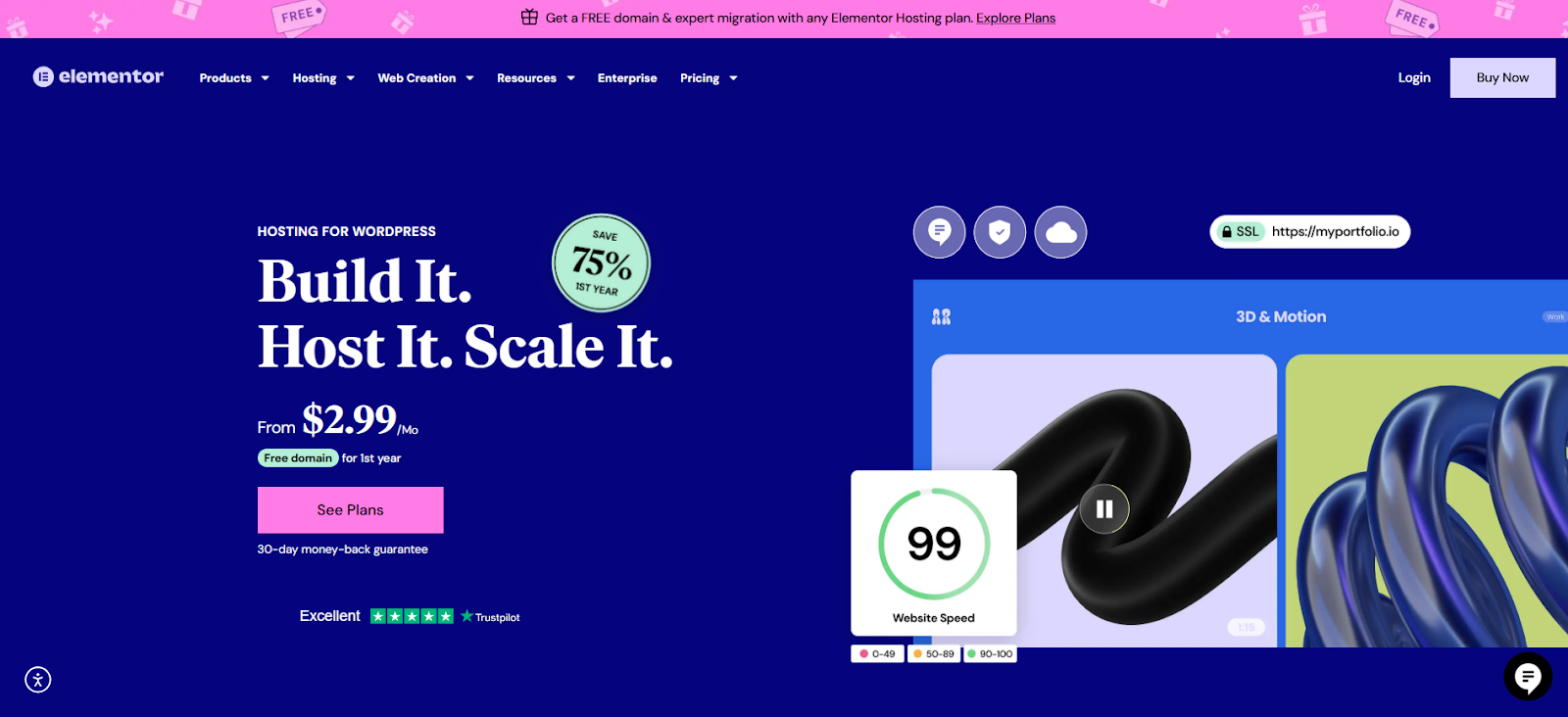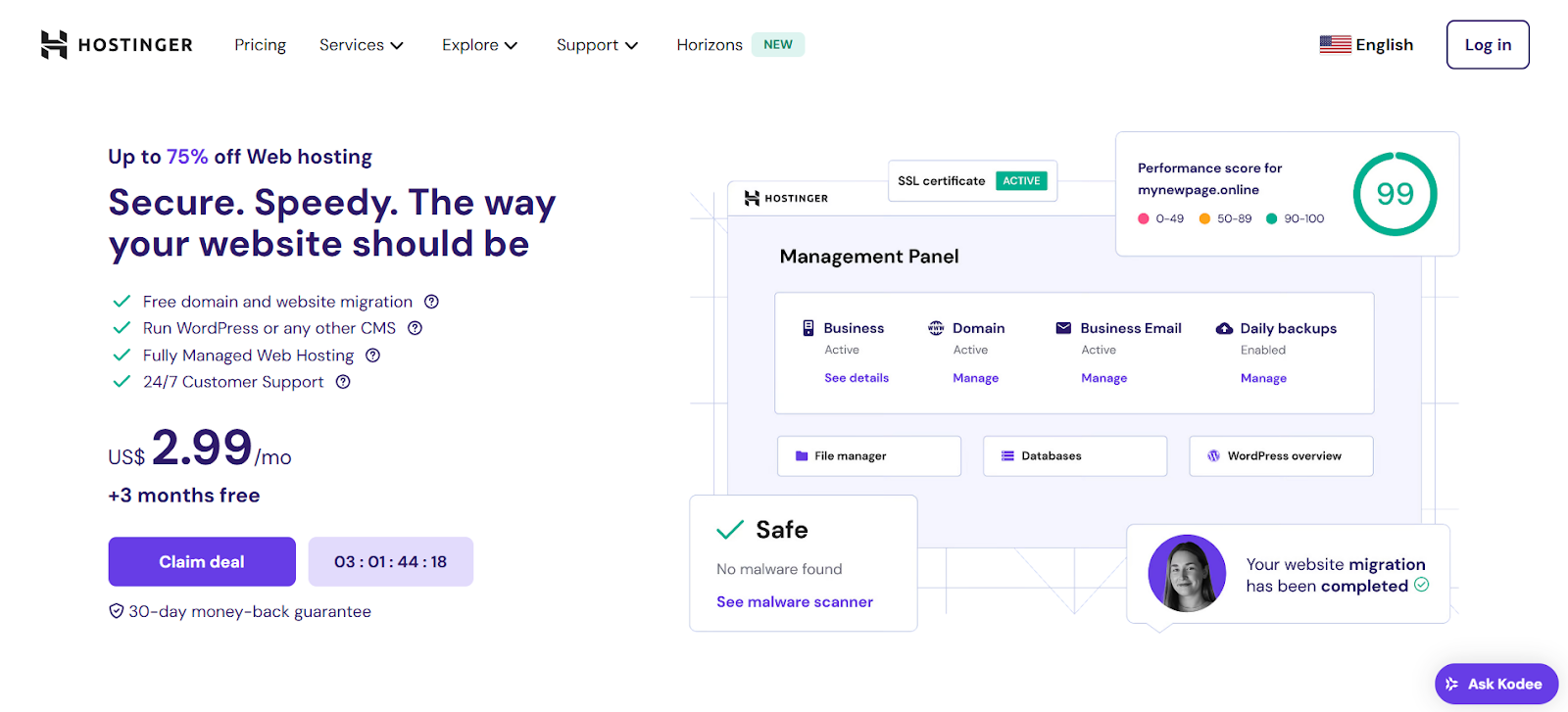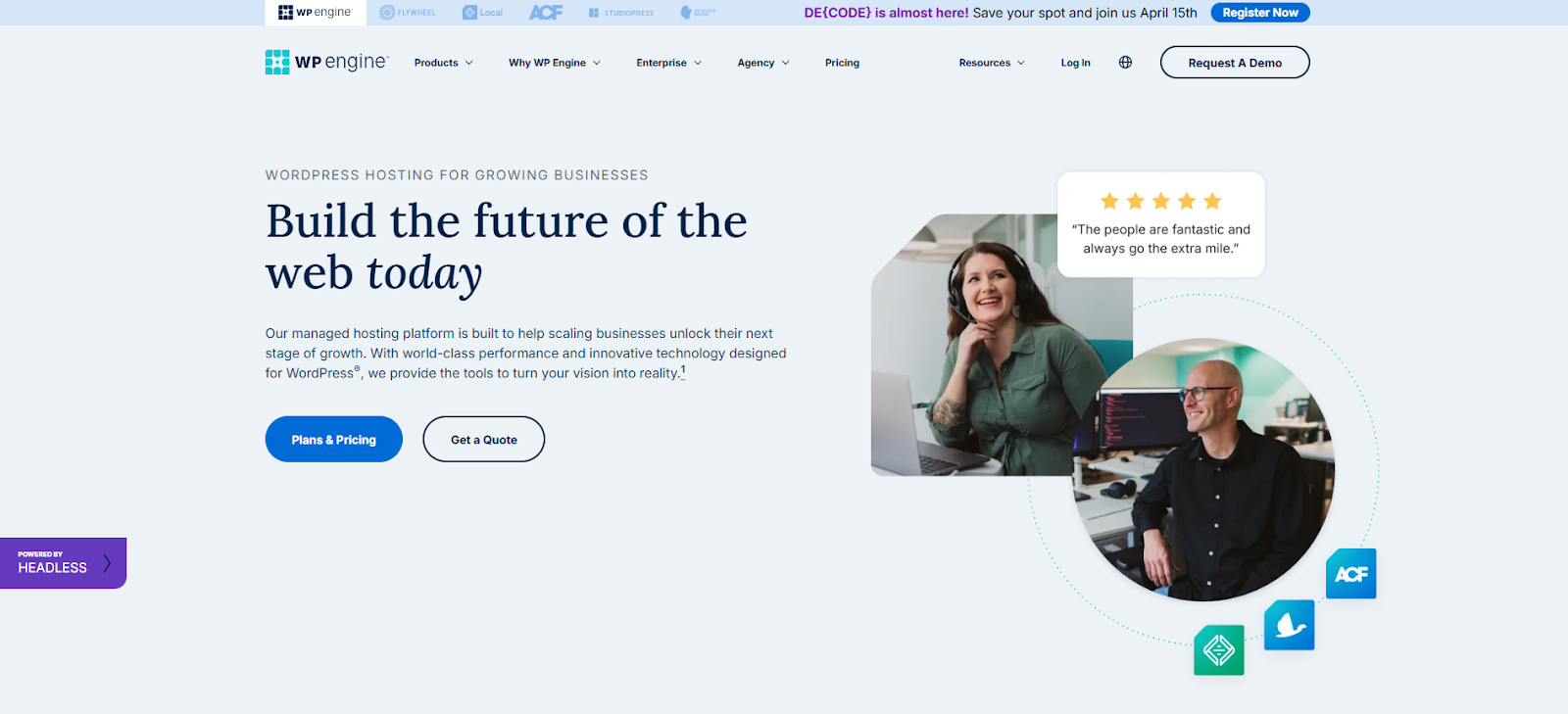Table of Contents
-
- Hosting Tuned for WordPress/WooCommerce
- Define Your Website’s Hosting Needs
- Planning Hosting for Future Site Growth
- Managing Your Web Hosting Budget Wisely
- Why Hosting Reliability & Uptime Matter
- Faster Speeds with NVMe Server Storage
- The Value of 24/7 Expert Hosting Support
- Need for an Easy-to-Use Control Panel
-
- Securing Your Site with SSL and HTTPS
- Setting Up Your Hosting Firewall Rules
- Performing Regular Security Checks
- Backup Strategies & Disaster Recovery
- WAF, DDoS & BotNet Defense Explained
- Adding Multi-Factor Auth Security
- Importance of 24/7 Security Monitoring
- Keeping Software Safe with Auto Updates
- Secure Database & File Transfer Access
- Automatic Security Patch Management
- Using Dev/Stage/Prod Environments Safely
- Benefits of Zero-Handshake TLS Security
- Conclusion
This comparison looks at three popular choices: Hostinger, WP Engine, and Elementor Hosting. We will explore their features to help you decide which fits your needs.
Hostinger vs WP Engine vs Elementor Hosting
Let’s examine what makes each of these hosting providers unique. We’ll examine their strengths, features, and who they typically serve best. Understanding these differences is key to finding the perfect match for your website project.
Elementor Hosting: All-in-One Solution for WordPress Websites

Elementor Hosting offers a managed WordPress environment specifically optimized for websites built with Elementor. It aims to provide a streamlined experience, bundling hosting with the WordPress CMS pre-installed. This setup allows users to get started quickly. The infrastructure uses the Google Cloud Platform, which focuses on speed and reliability. Features often include automatic backups, security tools, and free SSL certificates.
It’s important to note that Elementor Hosting includes the free Elementor Core plugin. If you need the advanced features of Elementor Pro, you must purchase that license separately. Elementor Hosting suits users who heavily rely on the Elementor page builder. It provides a convenient package where the hosting environment is tailored for the builder itself. This can simplify setup and improve performance for Elementor-based sites.
Key Strengths:
- Optimized specifically for Elementor and WordPress.
- Managed hosting environment simplifies technical tasks.
- Built on reliable Google Cloud infrastructure.
- Includes convenient features like automatic backups and SSL.
Potential Considerations:
- Elementor Pro is a separate purchase.
- May offer less flexibility for users not focused on Elementor.
Who is it Best For?
- Users building websites primarily with the Elementor page builder.
- Individuals and businesses looking for a simplified, integrated WordPress hosting solution.
- Those who value an environment tuned for Elementor performance.
Hostinger: Versatile and Budget-Friendly Hosting

Hostinger is well-known for its affordable hosting plans. They offer a wide variety of services, including shared hosting, cloud hosting, and VPS hosting. This makes them accessible for many different types of users, from beginners to more experienced developers. Hostinger plans often come with a user-friendly control panel (hPanel), free SSL certificates, and email accounts.
Their focus on competitive pricing attracts many website owners. They provide tools like a website builder and one-click installers for platforms like WordPress. Hostinger aims to balance cost with performance, offering features suitable for personal blogs, small businesses, and growing websites. Their global data centers help provide good loading speeds across different regions.
Key Strengths:
- Offers very competitive pricing across various hosting types.
- Provides a user-friendly custom control panel (hPanel).
- Includes useful features like free SSL and email accounts.
- Suitable for a wide range of users, from beginners onwards.
Potential Considerations:
- Resource limits on lower-tier shared plans.
- Support response times can vary during peak periods.
Who is it Best For?
- Individuals, bloggers, and small businesses needing affordable hosting.
- Beginners looking for an easy-to-use interface.
- Users who need flexibility with different types of hosting plans.
WP Engine: Premium Managed WordPress Hosting

WP Engine specializes exclusively in managed WordPress hosting. It caters to businesses, agencies, and developers who need high performance, robust security, and expert support. Its platform includes proprietary caching technology (EverCache®), global CDNs, and proactive security measures. WP Engine focuses heavily on the developer workflow. It offers features like staging environments, Git integration, and automated backups.
Their plans are positioned at a premium price point, reflecting the managed nature of the service and the level of support provided. WP Engine takes care of WordPress core updates, security patching, and performance optimization, allowing users to focus more on content creation and business growth. They are a strong choice for mission-critical websites where uptime and speed are paramount.
Key Strengths:
- Exceptional performance and speed optimizations for WordPress.
- Robust security features and proactive monitoring.
- Expert WordPress support available 24/7.
- Excellent tools for developers and agencies (staging, Git).
Potential Considerations:
- Higher price point compared to shared hosting providers.
- Exclusively focused on WordPress; not suitable for other platforms.
Who is it Best For?
- Businesses, agencies, and developers needing top-tier WordPress performance and reliability.
- Users managing high-traffic or mission-critical websites.
- Those who value expert support and advanced developer tools.
Grow Your Sales
- Incredibly Fast Store
- Sales Optimization
- Enterprise-Grade Security
- 24/7 Expert Service

- Incredibly Fast Store
- Sales Optimization
- Enterprise-Grade Security
- 24/7 Expert Service
- Prompt your Code & Add Custom Code, HTML, or CSS with ease
- Generate or edit with AI for Tailored Images
- Use Copilot for predictive stylized container layouts

- Prompt your Code & Add Custom Code, HTML, or CSS with ease
- Generate or edit with AI for Tailored Images
- Use Copilot for predictive stylized container layouts
- Craft or Translate Content at Lightning Speed
Top-Performing Website
- Super-Fast Websites
- Enterprise-Grade Security
- Any Site, Every Business
- 24/7 Expert Service

Top-Performing Website
- Super-Fast Websites
- Enterprise-Grade Security
- Any Site, Every Business
- 24/7 Expert Service
- Drag & Drop Website Builder, No Code Required
- Over 100 Widgets, for Every Purpose
- Professional Design Features for Pixel Perfect Design

- Drag & Drop Website Builder, No Code Required
- Over 100 Widgets, for Every Purpose
- Professional Design Features for Pixel Perfect Design
- Marketing & eCommerce Features to Increase Conversion
- Ensure Reliable Email Delivery for Your Website
- Simple Setup, No SMTP Configuration Needed
- Centralized Email Insights for Better Tracking

- Ensure Reliable Email Delivery for Your Website
- Simple Setup, No SMTP Configuration Needed
- Centralized Email Insights for Better Tracking

- Ensure Reliable Email Delivery for Your Website
- Simple Setup, No SMTP Configuration Needed
- Centralized Email Insights for Better Tracking
Selecting the Best Hosting Plan for You
Choosing the right host involves looking beyond just the company name. You need to match the plan’s specifics to your website’s requirements. Let’s explore key factors to consider.
Hosting Tuned for WordPress/WooCommerce
Does your website run on WordPress or WooCommerce? Some hosts specialize in these platforms. They optimize servers and provide tools specifically for them. This can lead to better performance and easier management compared to generic hosting.
Define Your Website’s Hosting Needs
What does your website actually need? Consider your expected traffic volume. How much storage space will your files and database require? Do you need specific software or features like email hosting? List your requirements before comparing plans.
Planning Hosting for Future Site Growth
Think about where your website might be in a year or two. Will your traffic increase significantly? Will you add more complex features? Choose a host that offers easy scalability. This means you can upgrade your resources without a difficult migration.
Managing Your Web Hosting Budget Wisely
Hosting costs vary widely. Based on your needs, set a realistic budget. While cheap plans are tempting, ensure they offer the necessary performance and reliability. Sometimes, paying a bit more provides better value through improved speed and support.
Why Hosting Reliability & Uptime Matter
Uptime refers to how often your website is online and accessible. Look for hosts guaranteeing high uptime (99.9% or higher). Frequent downtime frustrates visitors and hurts your search engine ranking. Reliability is absolutely essential.
Faster Speeds with NVMe Server Storage
Newer storage technology like NVMe SSDs offers much faster data access than older HDDs or even SATA SSDs. This translates directly to quicker website loading times. Check if potential hosts use NVMe storage for their servers.
The Value of 24/7 Expert Hosting Support
When problems arise, you need help quickly. Look for hosts offering 24/7 support through multiple channels (phone, chat, tickets). Test their responsiveness if possible. Expert support, especially for WordPress, can save you a lot of time and stress.
Need for an Easy-to-Use Control Panel
You will manage your hosting account through a control panel (like cPanel, Plesk, or a custom one). This panel should be intuitive and easy to navigate. It lets you manage files, databases, email accounts, domains, and backups. A good control panel simplifies website administration.
Key Factors for Smooth Hosting Migration
Moving your website to a new host can seem daunting. Proper planning makes the process much smoother. Here’s what to keep in mind.
Understanding the Data Transfer Steps
Migrating involves copying your website files and database and uploading them to the new server. Many hosts offer migration tools or services to help. Understand the steps involved, whether you do it manually or use a tool.
Handling Your Domain Name During Moves
Your domain name needs to point to the new hosting server. This involves changing the DNS (Domain Name System) settings at your domain registrar. Plan this change carefully to minimize downtime. DNS changes can take time to propagate globally.
Choosing Where to Host Your Emails
Will you host your email with your web host or use a separate service (like Google Workspace or Microsoft 365)? Decide this before migrating. Moving email accounts can be complex, so plan accordingly.
Tips to Prevent Downtime When Migrating
Prepare thoroughly to minimize downtime. Upload files and import the database to the new host before changing DNS settings. Test the site on the new server using a temporary URL or host file modification. Update DNS only when you’re confident everything works.
Using Simple One-Click Migration Tools
Many WordPress hosts offer free migration plugins or services. These tools automate much of the transfer process. They copy files and databases, often with minimal input needed from you. Check if your chosen host provides such a tool.
Boosting Site Performance on New Hosting
Once migrated, take steps to ensure your site runs optimally on its new platform. Don’t just assume the new host automatically speeds things up.
Actionable Performance Tuning Tactics
Explore the server-level settings your host provides. Optimize images before uploading them. Minify CSS and JavaScript files to reduce their size. Use well-coded themes and plugins. Regularly clean your database to remove old or unnecessary data.
Using Caching & CDN for Faster Loading
Caching stores copies of your site’s files closer to visitors, dramatically speeding up loading times. Most managed hosts offer server-level caching. A Content Delivery Network (CDN) distributes your site’s assets across global servers, further reducing load times for international visitors.
Gains from Cloud Infrastructure Hosting
Hosting built on cloud infrastructure (like Google Cloud or AWS) often provides better scalability and reliability. Cloud platforms can handle traffic spikes more effectively than traditional single-server setups, and many modern hosts leverage cloud benefits.
Essential Regular Maintenance Routines
Keep your website software updated, including WordPress core, themes, and plugins. Regularly back up your website. Monitor performance using tools like Google PageSpeed Insights. Consistent maintenance prevents issues and keeps performance high.
Essential Web Hosting Security Measures
Website security is non-negotiable. Your hosting provider plays a big role, but site owners also have responsibilities. Implement these essential measures.
Securing Your Site with SSL and HTTPS
An SSL certificate encrypts data between your server and visitors’ browsers. This enables HTTPS, which secures connections and builds trust. Most hosts offer free SSL certificates (e.g., Let’s Encrypt). Always use HTTPS.
Setting Up Your Hosting Firewall Rules
A Web Application Firewall (WAF) filters malicious traffic before it reaches your site. Many managed hosts include a WAF. You might also configure server-level firewall rules for added protection, restricting access to certain ports or IP addresses if needed.
Performing Regular Security Checks
Use security plugins or services to scan your website for malware and vulnerabilities. Regularly check file integrity and monitor user activity logs. Promptly address any suspicious findings.
Backup Strategies & Disaster Recovery
Regular backups are your safety net. Ensure your host provides automatic daily backups. Store copies off-site yourself as well. Have a clear plan for restoring your site from a backup if disaster strikes. Test your recovery plan periodically.
WAF, DDoS & BotNet Defense Explained
Beyond a basic WAF, look for protection against Distributed Denial of Service (DDoS) attacks. These attacks flood your server with traffic to take it offline. BotNet protection helps block automated malicious bots. Quality hosts offer multi-layered defense.
Adding Multi-Factor Auth Security
Enable Multi-Factor Authentication (MFA or 2FA) for your hosting account and WordPress admin login. This adds an extra layer of security beyond a password and makes unauthorized access much harder.
Importance of 24/7 Security Monitoring
Your host should monitor its network and servers for threats 24/7. Proactive monitoring can detect and block attacks before they impact your website, a key benefit of managed hosting services.
Keeping Software Safe with Auto Updates
Outdated software is a major security risk. Configure WordPress, themes, and plugins to update automatically when safe. Many managed hosts handle WordPress core updates for you. Keep PHP versions current, too.
Secure Database & File Transfer Access
Use strong, unique passwords for database access. Connect to your server using secure methods like SFTP or SSH, not plain FTP. Restrict file permissions appropriately so files cannot be easily modified by unauthorized users.
Automatic Security Patch Management
Good hosting providers proactively apply security patches to the server operating system and related software. This protects against known vulnerabilities at the infrastructure level. Managed hosting often excels in this area.
Using Dev/Stage/Prod Environments Safely
Use development (Dev) and staging environments to test changes before deploying them to the live (Prod) site. This prevents introducing bugs or security holes directly onto your public website. Many managed hosts offer easy staging environments.
Benefits of Zero-Handshake TLS Security
Modern security protocols like TLS 1.3 offer improvements such as zero round-trip time (0-RTT). This speeds up secure connection handshakes for returning visitors, enhancing both security and performance. Check if your host supports the latest TLS versions.
What’s Next for the Web Hosting Industry
The web hosting landscape constantly evolves. Technology advancements and changing priorities shape the future of hosting services. Here are some trends to watch.
New & Upcoming Hosting Technologies
Expect continued improvements in server hardware (CPUs, NVMe storage) and networking. Technologies like containerization (Docker, Kubernetes) allow for more flexible and scalable hosting deployments. Edge computing may bring content even closer to users.
Eco-Friendly Sustainable Data Centers
Environmental impact is a growing concern. Many hosting providers are investing in energy-efficient hardware and powering data centers with renewable energy sources. Look for hosts committed to sustainability.
AI & Automation in Hosting Management
Artificial intelligence (AI) and machine learning (ML) are being used more in hosting. They help optimize server performance, predict hardware failures, and enhance security threat detection. Automation simplifies server management tasks.
Rise of Green Energy Hosting Servers
The demand for “green hosting” powered by renewable energy (solar, wind) is increasing. More providers will likely highlight their use of sustainable energy sources as a key differentiator, reflecting a broader push towards environmental responsibility.
Conclusion
Choosing your web host is a foundational decision for your online presence. Hostinger provides accessible options for those starting out or watching their budget. WP Engine delivers premium, high-performance managed hosting for demanding WordPress sites. Elementor Hosting offers a tightly integrated environment for users building with the Elementor page builder.
Consider your specific needs: your budget, technical skill level, traffic expectations, and performance requirements. Think about future growth and the importance of support. An integrated solution, where your hosting is already tuned for your primary website building tools, can streamline your workflow and boost performance. Evaluate each provider’s strengths carefully to find the best fit for your project’s success.
Looking for fresh content?
By entering your email, you agree to receive Elementor emails, including marketing emails,
and agree to our Terms & Conditions and Privacy Policy.

